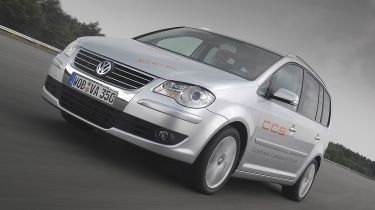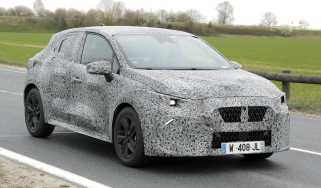Volkswagen Touran
The Touran's engine features the new Combined Combustion System, and it seems practical and economic

Rather than jumping straight into the hybrid and fuel cell markets, Volkswagen plans to develop as much as possible out of existing technology first. The German giant believes that today's engines still have lots to offer, and is developing them to meet ever-tightening emissions standards. CCS and GCI are acronyms that are set to become as familiar as the firm's TDI and FSI badges, particularly as early indications suggest the hi-tech systems are practical and economic for use in today's models.
Show your Auto Express press card at the gates of VW's secret German test track, and you would normally be accused of taking spy shots and given short shrift - but not this time.
In an effort to cement its position at the top of the hi-tech chart, VW has given us unprecedented access to its futuristic powerplants - and it looks as if there is life in the internal combustion engine yet.
The firm's Ehra-Lessien centre is where the Bugatti Veyron supercar hit 253mph, but it's the environment, not speed, that is now occupying the German giant's engineers.
The surprising news is that this won't signal the end of today's diesel and petrol units. VW says combustion engines will still dominate for a long time yet - they just won't be in the form that we're used to!
Top of the technology list is VW's Combined Combustion System (CCS). Trialled here in a Touran compact MPV, the gadgetry combines the direct injection concept of the maker's TDI diesel and hi-tech systems used by TSI petrol motors to clean up oil-burning combustion, while also reducing CO2 output. In unifying diesel and petrol theories, VW says it has created a brand new engine concept.
So how does it work? By carefully controlling fuel injection and valve timing, VW can create the perfect mixture of fuel and air. A large proportion of exhaust gases are recirculated, too, resulting in clean combustion with no particulate or soot and low nitrogen oxide emissions. For now, the application of CCS is limited. Conditions have to be just perfect for the technology to work, with low engine revs and gentle acceleration required. However, emissions are significantly reduced when the system is active, and VW's engineers hope to broaden its scope in the near future.
There is one final string to this Touran's bow. Even though its powerplant started life as a conventional 2.0-litre TDI diesel before having the CCS equipment installed, it can now also run on a second-generation biofuel known as SunFuel.
Engineers claim this is purer and more sustainable than today's green fuels, although we're unlikely to see it available commercially before 2015.
In practice, all of the technologies work seamlessly. The Touran prototype we tried performed and handled in exactly the same way as a current TDI, with CCS helping to clean up emissions without intruding on the driving experience.
Petrol units haven't been forgotten. We also drove a Golf which felt like a 1.6 FSI petrol model, but was fitted with Gasoline Compression Injection, or GCI. This uses diesel-style compression ignition, rather than spark plugs, which helps the petrol powerplant deliver economy on a par with an oil-burner, but without soot and a dramatic fall in other emissions.







